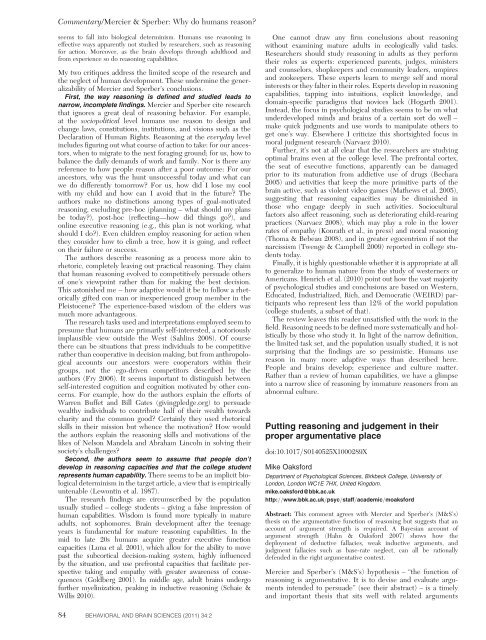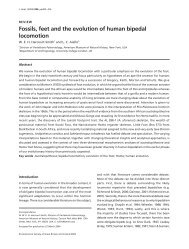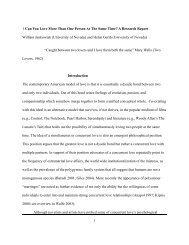Why do humans reason? Arguments for an argumentative theory
Why do humans reason? Arguments for an argumentative theory
Why do humans reason? Arguments for an argumentative theory
Create successful ePaper yourself
Turn your PDF publications into a flip-book with our unique Google optimized e-Paper software.
Commentary/Mercier & Sperber: <strong>Why</strong> <strong>do</strong> <strong>hum<strong>an</strong>s</strong> <strong>reason</strong>?seems to fall into biological determinism. Hum<strong>an</strong>s use <strong>reason</strong>ing ineffective ways apparently not studied by researchers, such as <strong>reason</strong>ing<strong>for</strong> action. Moreover, as the brain develops through adulthood <strong>an</strong>dfrom experience so <strong>do</strong> <strong>reason</strong>ing capabilities.My two critiques address the limited scope of the research <strong>an</strong>dthe neglect of hum<strong>an</strong> development. These undermine the generalizabilityof Mercier <strong>an</strong>d Sperber’s conclusions.First, the way <strong>reason</strong>ing is defined <strong>an</strong>d studied leads tonarrow, incomplete findings. Mercier <strong>an</strong>d Sperber cite researchthat ignores a great deal of <strong>reason</strong>ing behavior. For example,at the sociopolitical level <strong>hum<strong>an</strong>s</strong> use <strong>reason</strong> to design <strong>an</strong>dch<strong>an</strong>ge laws, constitutions, institutions, <strong>an</strong>d visions such as theDeclaration of Hum<strong>an</strong> Rights. Reasoning at the everyday levelincludes figuring out what course of action to take: <strong>for</strong> our <strong>an</strong>cestors,when to migrate to the next <strong>for</strong>aging ground; <strong>for</strong> us, how tobal<strong>an</strong>ce the daily dem<strong>an</strong>ds of work <strong>an</strong>d family. Nor is there <strong>an</strong>yreference to how people <strong>reason</strong> after a poor outcome: For our<strong>an</strong>cestors, why was the hunt unsuccessful today <strong>an</strong>d what c<strong>an</strong>we <strong>do</strong> differently tomorrow? For us, how did I lose my coolwith my child <strong>an</strong>d how c<strong>an</strong> I avoid that in the future? Theauthors make no distinctions among types of goal-motivated<strong>reason</strong>ing, excluding pre-hoc (pl<strong>an</strong>ning – what should my pl<strong>an</strong>sbe today?), post-hoc (reflecting—how did things go?), <strong>an</strong><strong>do</strong>nline executive <strong>reason</strong>ing (e.g., this pl<strong>an</strong> is not working, whatshould I <strong>do</strong>?). Even children employ <strong>reason</strong>ing <strong>for</strong> action whenthey consider how to climb a tree, how it is going, <strong>an</strong>d reflecton their failure or success.The authors describe <strong>reason</strong>ing as a process more akin torhetoric, completely leaving out practical <strong>reason</strong>ing. They claimthat hum<strong>an</strong> <strong>reason</strong>ing evolved to competitively persuade othersof one’s viewpoint rather th<strong>an</strong> <strong>for</strong> making the best decision.This astonished me – how adaptive would it be to follow a rhetoricallygifted con m<strong>an</strong> or inexperienced group member in thePleistocene? The experience-based wis<strong>do</strong>m of the elders wasmuch more adv<strong>an</strong>tageous.The research tasks used <strong>an</strong>d interpretations employed seem topresume that <strong>hum<strong>an</strong>s</strong> are primarily self-interested, a notoriouslyimplausible view outside the West (Sahlins 2008). Of coursethere c<strong>an</strong> be situations that press individuals to be competitiverather th<strong>an</strong> cooperative in decision making, but from <strong>an</strong>thropologicalaccounts our <strong>an</strong>cestors were cooperators within theirgroups, not the ego-driven competitors described by theauthors (Fry 2006). It seems import<strong>an</strong>t to distinguish betweenself-interested cognition <strong>an</strong>d cognition motivated by other concerns.For example, how <strong>do</strong> the authors explain the ef<strong>for</strong>ts ofWarren Buffet <strong>an</strong>d Bill Gates (givingpledge.org) to persuadewealthy individuals to contribute half of their wealth towardscharity <strong>an</strong>d the common good? Certainly they used rhetoricalskills in their mission but whence the motivation? How wouldthe authors explain the <strong>reason</strong>ing skills <strong>an</strong>d motivations of thelikes of Nelson M<strong>an</strong>dela <strong>an</strong>d Abraham Lincoln in solving theirsociety’s challenges?Second, the authors seem to assume that people <strong>do</strong>n’tdevelop in <strong>reason</strong>ing capacities <strong>an</strong>d that the college studentrepresents hum<strong>an</strong> capability. There seems to be <strong>an</strong> implicit biologicaldeterminism in the target article, a view that is empiricallyuntenable (Lewontin et al. 1987).The research findings are circumscribed by the populationusually studied – college students – giving a false impression ofhum<strong>an</strong> capabilities. Wis<strong>do</strong>m is found more typically in matureadults, not sophomores. Brain development after the teenageyears is fundamental <strong>for</strong> mature <strong>reason</strong>ing capabilities. In themid to late 20s <strong>hum<strong>an</strong>s</strong> acquire greater executive functioncapacities (Luna et al. 2001), which allow <strong>for</strong> the ability to movepast the subcortical decision-making system, highly influencedby the situation, <strong>an</strong>d use prefrontal capacities that facilitate perspectivetaking <strong>an</strong>d empathy with greater awareness of consequences(Goldberg 2001). In middle age, adult brains undergofurther myelinization, peaking in inductive <strong>reason</strong>ing (Schaie &Willis 2010).One c<strong>an</strong>not draw <strong>an</strong>y firm conclusions about <strong>reason</strong>ingwithout examining mature adults in ecologically valid tasks.Researchers should study <strong>reason</strong>ing in adults as they per<strong>for</strong>mtheir roles as experts: experienced parents, judges, ministers<strong>an</strong>d counselors, shopkeepers <strong>an</strong>d community leaders, umpires<strong>an</strong>d zookeepers. These experts learn to merge self <strong>an</strong>d moralinterests or they falter in their roles. Experts develop in <strong>reason</strong>ingcapabilities, tapping into intuitions, explicit knowledge, <strong>an</strong>d<strong>do</strong>main-specific paradigms that novices lack (Hogarth 2001).Instead, the focus in psychological studies seems to be on whatunderdeveloped minds <strong>an</strong>d brains of a certain sort <strong>do</strong> well –make quick judgments <strong>an</strong>d use words to m<strong>an</strong>ipulate others toget one’s way. Elsewhere I criticize this shortsighted focus inmoral judgment research (Narvaez 2010).Further, it’s not at all clear that the researchers are studyingoptimal brains even at the college level. The prefrontal cortex,the seat of executive functions, apparently c<strong>an</strong> be damagedprior to its maturation from addictive use of drugs (Bechara2005) <strong>an</strong>d activities that keep the more primitive parts of thebrain active, such as violent video games (Mathews et al. 2005),suggesting that <strong>reason</strong>ing capacities may be diminished inthose who engage deeply in such activities. Socioculturalfactors also affect <strong>reason</strong>ing, such as deteriorating child-rearingpractices (Narvaez 2008), which may play a role in the lowerrates of empathy (Konrath et al., in press) <strong>an</strong>d moral <strong>reason</strong>ing(Thoma & Bebeau 2008), <strong>an</strong>d in greater egocentrism if not thenarcissism (Twenge & Campbell 2009) reported in college studentstoday.Finally, it is highly questionable whether it is appropriate at allto generalize to hum<strong>an</strong> nature from the study of westerners orAmeric<strong>an</strong>s. Henrich et al. (2010) point out how the vast majorityof psychological studies <strong>an</strong>d conclusions are based on Western,Educated, Industrialized, Rich, <strong>an</strong>d Democratic (WEIRD) particip<strong>an</strong>tswho represent less th<strong>an</strong> 12% of the world population(college students, a subset of that).The review leaves this reader unsatisfied with the work in thefield. Reasoning needs to be defined more systematically <strong>an</strong>d holisticallyby those who study it. In light of the narrow definition,the limited task set, <strong>an</strong>d the population usually studied, it is notsurprising that the findings are so pessimistic. Hum<strong>an</strong>s use<strong>reason</strong> in m<strong>an</strong>y more adaptive ways th<strong>an</strong> described here.People <strong>an</strong>d brains develop; experience <strong>an</strong>d culture matter.Rather th<strong>an</strong> a review of hum<strong>an</strong> capabilities, we have a glimpseinto a narrow slice of <strong>reason</strong>ing by immature <strong>reason</strong>ers from <strong>an</strong>abnormal culture.Putting <strong>reason</strong>ing <strong>an</strong>d judgement in theirproper <strong>argumentative</strong> place<strong>do</strong>i:10.1017/S0140525X1000289XMike Oaks<strong>for</strong>dDepartment of Psychological Sciences, Birkbeck College, University ofLon<strong>do</strong>n, Lon<strong>do</strong>n WC1E 7HX, United King<strong>do</strong>m.mike.oaks<strong>for</strong>d@bbk.ac.ukhttp://www.bbk.ac.uk/psyc/staff/academic/moaks<strong>for</strong>dAbstract: This comment agrees with Mercier <strong>an</strong>d Sperber’s (M&S’s)thesis on the <strong>argumentative</strong> function of <strong>reason</strong>ing but suggests that <strong>an</strong>account of argument strength is required. A Bayesi<strong>an</strong> account ofargument strength (Hahn & Oaks<strong>for</strong>d 2007) shows how thedeployment of deductive fallacies, weak inductive arguments, <strong>an</strong>djudgment fallacies such as base-rate neglect, c<strong>an</strong> all be rationallydefended in the right <strong>argumentative</strong> context.Mercier <strong>an</strong>d Sperber’s (M&S’s) hypothesis – “the function of<strong>reason</strong>ing is <strong>argumentative</strong>. It is to devise <strong>an</strong>d evaluate argumentsintended to persuade” (see their abstract) – is a timely<strong>an</strong>d import<strong>an</strong>t thesis that sits well with related arguments84 BEHAVIORAL AND BRAIN SCIENCES (2011) 34:2




